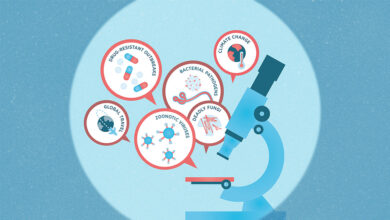
PPF Health Security: Misinformation and penguin problems
Sponsored by:

PPF’s report The Next One: Preparing Canada for Another Health Emergency outlines the lessons learned from the pandemic and how Canada can safeguard against future health emergencies.
To keep the discussion going — and to keep Canadians informed – this newsletter looks at what’s happening in the world of health security each week.
Here’s what we’re following:
Doctors vs. misinformation
The Canadian Medical Association released results from a poll on Canadians’ exposure to health misinformation and its impact. A full 80 percent of respondents said they are very or somewhat interested in health news when they see it, and even more (88 percent) think it’s important.
But when they do see it, Canadians are skeptical. A full 74 percent of respondents said they feel there is an equal amount of accurate and inaccurate health information online, and 50 percent said that at least some of the information about health issues they see in media or hear about from friends and family is either wrong, misleading or is misinformation. Forty percent said misinformation over the last three years has even led to mental distress or increased anxiety.
Social media was deemed the least trustworthy source of health information, even though that’s where Canadians say they spend a substantial amount of time. Canadians said they have the most trust for physicians, pharmacists and nurses (in that order), followed closely by Health Canada and the Public Health Agency of Canada.
“Physicians are trusted sources of health information for our patients and their families due to our expertise, experience and commitment to providing accurate and reliable data-driven answers to complex questions (that are) essential to combat misinformation,” CMA President Kathleen Ross told PPF. Read our full coverage of the report here.
Climate health
The World Health Organization noted that the global cholera risk is “very high,” but African nations are seeing the worst of it, with more than half the world’s cases in 2023 occurring on the continent. Among the worst-hit nations is Zambia, which has had more than 13,000 cases and close to 500 deaths since October, according to UNICEF.
This week, Zambia’s government ordered that schools remain closed for a further two weeks — a delay that follows an already late return to schools after the Christmas break. The decision will impact around 4.3 million children.
Meanwhile, Zimbabwe this week launched a cholera vaccination campaign in the hopes of immunizing more than 2 million people. Since February 2023, cholera has killed more than 400 people and infected more than 20,000 in that country, with children accounting for about half of all cases. Partly to blame for all this: “Cholera is a climate change issue,” director general Jean Kaseya of the African Centres for Disease Control said last week, as floods across southern Africa limit safe water access and challenge health systems.
And a looming crisis
Climate change is also behind a warning this week from a committee of UK parliamentarians. Unless changes are implemented, by 2050 as many as 10,000 people could die every year of extreme heat waves.
The committee’s recommendations include that the national weather office name heat waves, as it does now with storms. The MPs also recommended building more parks and “green infrastructure,” as well as the creation of a national plan to retrofit homes to help keep them cooler in heat. The report estimated that the increased frequency of heat waves by 2050 could cost the UK economy $100 billion per year.
Pandemic treaty
World Health Organization Director General Tedros Adhanom Ghebreyesus said that reaching an agreement on a pandemic treaty, which would guarantee poorer nations have access to therapeutics and vaccines when the next pandemic hits, is “mission critical for humanity.”
The WHO’s 194 member states agreed in 2022 to develop a new international accord on pandemic preparedness, with a deadline of May 2024. Hitting that date will require overcoming a big sticking point that has emerged around access to patented information on vaccines. U.S. negotiators have rejected proposals to loosen patent projections, POLITICO reported last week.
Advocates of the treaty want poorer nations to be able to produce their own vaccines and drugs in a pandemic, and to avoid the kind of hoarding of vaccines by rich nations that occurred during COVID. Last December, an audit of Canada’s COVID-19 vaccine procurement found a failure to minimize waste, leading to millions of unused and expired vaccine doses.
Another obstacle facing the treaty: misinformation. On social media the treaty has been described as a power grab that will lead to lockdowns, vaccine mandates and limits on free speech. Ghebreyesus has said the treaty is being bogged down in “a torrent of fake news, lies and conspiracy theories.”
Avian flu
Researchers announced last week that they’ve discovered H5N1, a deadly strain of avian flu, in gentoo penguins for the first time. The Scientific Committee on Antarctic Research (SCAR) said it found 35 penguins dead in the Falkland Islands on Jan. 19, and that samples taken from two of the birds tested positive for H5N1. SCAR researchers also said that they found over 200 dead gentoo penguin chicks.
The penguins are the latest in a lengthy line of birds whose numbers have been significantly impacted over the last several months by H5N1, which has hit bird populations on every continent except Oceania and Antarctica. Because gentoo penguins are unlikely to make the journey to the Antarctic, the current outbreak on the Falkland Islands suggests it will be contained to local penguin populations.
This strain has already made the jump to other species. In December, Alaska’s Division of Environmental Health confirmed that a polar bear died earlier in the fall from H5N1. Alaska previously reported avian flu as the cause of death for a few red foxes, one black bear and one brown bear. Last year, more than 5,000 sea lions were found dead in Peru. And more than 17,000 elephant seal pups were killed in Argentina — 96 percent of the juvenile population.
Although the risk to human health remains low, the economic impacts are a different story: Mass poultry slaughters to prevent spread are ongoing, raising prices on basic goods, including eggs.
Biotech targets
On Sunday, WuXi AppTec, a Chinese drug research and development group, issued a statement saying that it feels it shouldn’t be listed as a “biotechnology company of concern” in the latest draft of a U.S. bill. That bipartisan bill would, if passed, also bar China’s largest genomics company, BGI, from doing business in the U.S.
In 2021, a Reuters investigation found that BGI’s prenatal test was developed in collaboration with the Chinese military and was being used by the company to collect genetic data. Although the prenatal test wasn’t being used in the U.S., the National Counterintelligence and Security Center warned at the time that such tests could “provide another mechanism for the People’s Republic of China and Chinese biotech companies to collect genetic and genomic data from around the globe.”
At the same time, the NCSC cited WuXi Pharma Tech’s 2015 acquisition of NextCODE Health, a U.S. company, as an example of how Chinese companies “have taken advantage” of the fact that American “safeguards focus primarily on privacy, not national security” — something the NCSC called a “vulnerability.”
Events:
- Feb 9: Global Conference on Biotechnology, Bioengineering & Biomedical Engineering. Vancouver, B.C.
- Feb. 11-14: SCOPE Summit 2024. Orlando, Fla.
- Feb. 15-16: 9th World Conference on Applied Microbiology and Beneficial Microbes. Rome, Italy
- Feb. 21: Wall Street Journal Health Forum. Boston, Mass.
- Feb. 22: Future of Health Leadership, Informatics and Policy Conference. Toronto, Ont.
- Feb. 22-23: GENAP Summit 2024. Geneva, Switzerland
- Feb. 25-28: ViVe 2024. Los Angeles, Calif.
- March 8-12: SXSW Health and MedTech Track 2024. Austin, Texas
- March 11-15: 2024 HIMSS Global Health Conference. Orlando, Fla.
- May 16: STAT Breakthrough Summit West, San Francisco, Calif.
Did someone forward you this newsletter? Subscribe to PPF: Health Security newsletter
This newsletter is produced by journalists at PPF Media and it maintains complete editorial independence.



